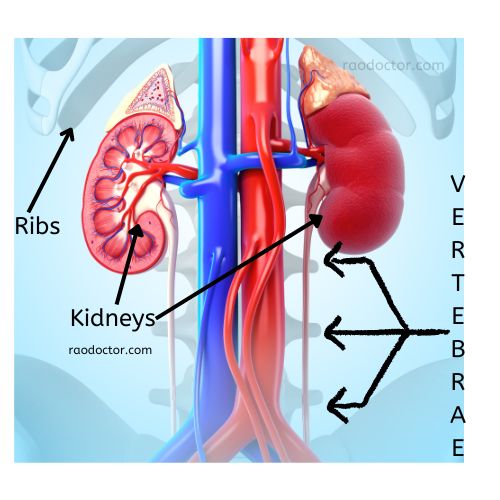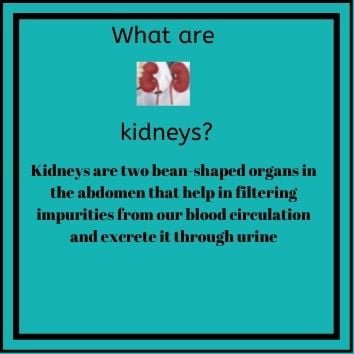
Image source- FreePik.com
Table of Contents
Your Kidneys Are the Doorways to a good health
What do I exactly mean by this statement? Well, it means that if our kidneys are healthy, our body remains healthy.
What prompted me to write this article?
With an ever-increasing population worldwide, diseases related to different organs suffered by human beings are also on the rise. One of them is kidney disease.
You may be at risk of developing kidney disease if you are already having these conditions-
- Hypertension
- Diabetes
- Recurrent urinary tract infections
Hi, I am Dr. Rao and I will be talking on one very important organ in our body- Your Kidneys. Would you like to listen to this article while reading it? Then, click below-
Way back in the 1990s, my mother succumbed to chronic kidney disease, also known popularly as Kidney Failure. I have seen the sufferings she has gone through- the investigations, the dialysis, post-dialysis sufferings etc.
And after that, as the years passed by, I have been a witness to an increase in the number of patients that visit my clinic with various stages of kidney failure. At some point in this period, up to this date, it was at the back of my mind that I should post an article on kidneys and their disease.
In this article, I am going to discuss this intriguing yet wonderful organ- what it is, where it is located and all the other related stuff.
Following this post, there will be a series of posts on the various diseases, investigations, the entire urinary system and their diseases and some useful information on what to look out for in kidney disease.
Do read all the posts and bookmark them for future reference.
What is a kidney?
Our digestive system breaks down what we eat into small molecules of protein, carbohydrates and fats that can be easily absorbed into our blood circulation. These particles or molecules then make their way to the liver and other organs where they are either stored or used up to provide energy for the overall growth of our body and help the tissues to carry out their designated functions. They also provide energy for us to do physical or mental activities.
In doing so, a lot of waste material is produced in the form of urea, creatinine, uric acid, ketones, etc. This waste is flushed out of our body after filtration in our kidneys through urine.
So, we can compare our kidneys to the huge water filtration plants in our towns or the water filter in our homes that filter out dirt and impurities from water. The only difference is kidneys filter out impurities from our blood and retain materials that are necessary for our body.
What are various parts of Kidney?
Have a close look at the cross section of the kidney shown below. I am sure you can see it as half part of kidney beans [or rajma, in India]. Also shown in this picture are the various units of the kidney that take part in filtering the metabolic wastes [listen to it below] from our blood.

A kidney is an organ that is present in our abdomen (our belly). It is an important part of our body, just like all other organs, because it is the only organ that can clear the metabolic waste from our body.

You all must be aware that we all have two kidneys. You also must be aware that the kidneys are bean-shaped organs located in the back of our abdomen. They each are as big as your closed fist (as shown in the image below).

How do kidneys work?
Your kidneys are like biological water filters. They clean your blood by filtering out waste and extra fluid, along with other harmful substances like bacteria.
They also help keep your blood at the right pH balance, and they regulate your body’s salt and mineral levels. The blood that travels from your heart through your arteries enters your kidneys via the renal arteries. Your kidneys have tiny blood vessels called “nephrons” that filter out waste and extra fluid, along with other harmful substances like bacteria.
The filtered blood travels back to your heart through your renal veins and back into your circulation.
Kidney Function
One important part of kidney function is regulating blood pressure. When your kidneys notice that you’re dehydrated, they release a hormone- the Anti-diuretic hormone [ADH]- that tells your body to hold onto more water.
This regulation is important because if your blood pressure is too high, it can damage your heart and put you at risk for heart disease.
When your kidneys aren’t healthy, they can’t do their job efficiently. The amount of waste your kidneys can filter out of your blood depends on how healthy your kidneys are in the first place.
If you have any kidney-related health issues, it’s important to get treatment as soon as possible to avoid further complications.
What are metabolic wastes?
Before we proceed, you can listen to this short summary I have created for you so that you can follow what is written, in a better way-
After we eat, food particles are broken down and digested by our intestines into smaller particles [see below] that are easily absorbed, again in the intestines.
These absorbed food particles are made up of Proteins (amino acids), Carbohydrates (glucose), and Fats( fatty acids).
These food particles help us by-
- Building our body(proteins)
- Giving us energy (carbohydrates)
- Maintaining the body cells (fats)
They all circulate in the blood and are further broken down into smaller particles for the above-mentioned functions. Whatever excess remains are known as metabolic waste in the form of urea, uric acid, creatinine, cholesterol, glucose, etc.
Metabolic wastes of proteins like urea, uric acid, and creatinine are excreted by our kidneys through urine. At times, glucose and fats [ chylomicrons] are also excreted through our renal system.
Absorbed sugar circulates in our blood in the form of glucose. Excess glucose is stored in our liver in the form of glycogen and is used by the body when the circulating glucose gets depleted ( e.g., during prolonged fasting). In diabetes, this excess may be excreted through urine off and on.
Excess fats are stored in the liver and in tissue called the adipose tissue. This adipose tissue is present in large quantities in the abdomen in a tissue called the peritoneum. This accounts for the Visceral Fats in our body. Your kidneys lie behind the peritoneum- that is why it is called a retro-peritoneal organ.
The rest of it is present surrounding important organs like the heart and kidneys.
Location of the kidneys-


Kidneys are two small organs that are shaped like a bean, and they’re located directly beneath the ribs on either side of the spine. The picture on your left shows how your kidneys are placed in your abdomen relative to other organs. The picture on your right shows the exact position of your kidneys in relation to vertebral column.
The Kidneys and Your Health-
If one or both the kidneys are affected by any disease, which we will learn about shortly, chances are your life gets totally disrupted. You can click here for a detailed study of disease of these excretory organs.
https://raodoctor.com/
Important note about your kidneys: They only have a limited supply of functioning units.
Your kidneys are living organs that are always doing something for you, but they only have a certain amount of functioning units that are called Nephrons. When their ability to filter blood is reduced, it’s often because of some type of injury or damage. This injury is called glomerulonephritis.
Kidneys break down and can be damaged by conditions like diabetes, hypertension, or even a genetics-related disease like polycystic kidney disease.
It’s important to know that they’re not indestructible, and that they can be damaged or compromised over time
Know all about your kidney- a video
Here is a short video which will explain to you about your kidney and its function-
Why is understanding your kidneys important?
As we mentioned above, your kidneys are living organs that do a lot for you every day. But they can also be damaged by certain things, like a high sugar diet or a high-protein diet, which can increase your risk of developing Type 2 diabetes and kidney injury [glomerulonephritis].
Certain medications, like antibiotics, can also cause damage to your kidneys. If your kidneys are damaged in some way, it’s important to get treatment for them immediately. When your kidneys aren’t healthy, they can’t do their job efficiently.
The amount of waste your kidneys can filter out of your blood depends on how healthy your kidneys are in the first place. If you have any kidney-related health issues, it’s important to get treatment as soon as possible to avoid further complications.
6 Ways to Prolong the Life of Your Kidneys
Stay hydrated – Dehydration is one of the things that can cause kidney damage but staying hydrated can help. Drinking at least two liters of water per day can help keep your kidneys healthy, and it can also help you avoid urinary tract infections.
Avoid Sugar – Eating a high-sugar diet can cause damage to your kidneys, including a condition called diabetes. Avoiding sugar and eating a healthy, balanced diet can help prevent this.
Eat a healthy and balanced diet – Just like with sugar, eating a balanced diet can help prevent damage to your kidneys.
Maintain a healthy body weight – Having a healthy body weight can help your kidneys stay healthy.
Limit your protein intake – Eating too much protein can also cause damage to your kidneys.
Regular exercise – Exercising regularly can help reduce your risk of developing chronic kidney disease.
3 signs that you might have a problem with your kidneys:

If you notice any of these symptoms in yourself or someone else, it might be a sign that there’s a problem with the kidneys: –
Swelling around the ankles –
Kidney disease may cause swelling around the ankles, which could be a sign of high blood pressure. It’s important to monitor this symptom since it can increase your risk of heart disease.
Frequent or severe Urinary tract infections –
You may develop frequent or severe UTIs if your kidneys are not filtering your blood effectively. –
Changes in the way you look –
Weight gain or weight loss, sudden hair loss, or changes in your skin colour are also signs that something might be wrong.
Conclusion
Kidneys are important organs in the human body. They are responsible for cleaning our blood and regulating our blood pressure. Kidneys can also be damaged by sugar, high protein, and dehydration. If you follow the tips mentioned above, you can reduce the risk of damage to your kidneys. Make sure to keep an eye on your kidneys so that you can catch any issues early and get the treatment you need!
If you have enjoyed reading this article, then do share it by clicking the quote below-
Know Your Kidneys – What They Are and How They Work Share on XAffiliate disclosure
Some of the links used in this article are affiliate links. i.e., if you sign up for their paid program or make a purchase, I will get a commission, at no extra cost to you. Please be rest assured that I only recommend software/ products I genuinely believe in, and trust to be good for you too.
Final words
My next article will be on various urinary tract infections, including that of kidneys. Do sign-in to my newsletter using your e-mail ID.
Adios.

